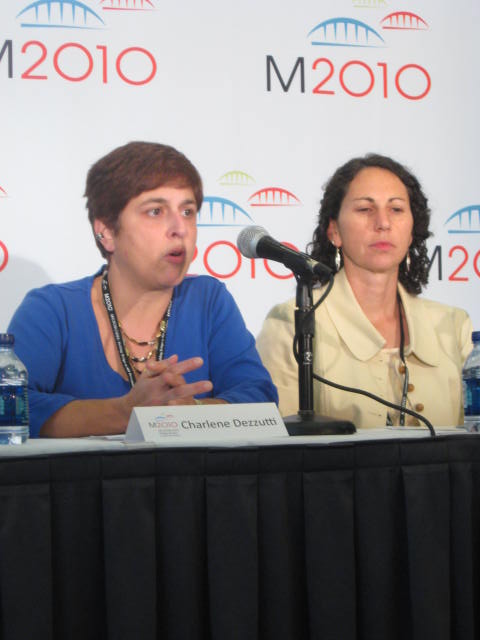A rectal microbicide as a new HIV prevention technology is urgently needed in Africa for the large number of people practicing anal sex.
Current HIV prevention efforts are unable to contain or reduce the spread of HIV infection through anal sex.

One of the highlights of
Microbicides 2010 was the presentation
Does Africa need a rectal microbicide? by Salim S. Abdool Karim (Slim), Pro Vice-Chancellor (Research): University of KwaZulu-Natal, Director: CAPRISA, Professor in Clinical Epidemiology, Columbia University and Adjunct Professor of Medicine, Cornell University.
The information Slim presented painted a deadly serious picture of neglect, denial, and criminalization with regard to the prevalence of anal sex among both men and women, as well as the near invisibility of gay men and other men who have sex with men in Africa despite harrowing rates of HIV. However, it was heartening and inspiring to have some serious. long-awaited attention paid to these issues - made all the better coming from one of the world's top researchers in the field.
Click
here for his slides.
What follows is an excellent summary of the presentation by Henry Neondo via
African Science News
Africa ripe for rectal microbicides
Africa needs microbicides for both vaginal and rectal use in prevention of mucosal infection of HIV, a mini-symposium at the ongoing International Microbicides Conference in Pittsburgh, Pennsylvania, US was told. The symposium heard that the contribution to HIV flame in Africa by the anal route is still under-reported and that time to unpack the myth was long overdue.
According to Dr Salim S. Abdool Karim, Pro Vice-Chancellor (Research), Univesity of KwaZulu Natal and Director of the Center for the AIDS Programme of Research in South Africa, CAPRISA, Africa needs to take a leap from the assumptions that HIV is spread only through the penile route.
“But a rectal microbicide as a new HIV prevention technology is urgently needed in Africa for the large number of people practicing anal sex---namely the men who have sex with men, bisexual men and women”, he said.
Dr Karim said although data on anal sex is as rare as data on the true situation of HIV in men who have sex with men throughout Africa, anonymous surveys in various parts of Africa show interesting pictures.
In Cape Town, South Africa, a survey of 2593 men and 1818 women showed that 14% of men and 10% of women had anal intercourse in the past three months.
In KwaZulu Natal, South Africa, 40.8% of the surveyed reported practicing anal intercourse. Worse, 30% of these reported never or rarely using condom during an intercourse.
Dr Karim said consistent use of condom in anal sex was lower that peno-vaginal intercourse.
The same scenario is reflected in Kenya and Nigeria, which report that 12% of public secondary schools students practice anal sex.
In all these countries, people who do not have knowledge of any HIV infected persons, a poor knowledge of increased HIV risks and distant HIV test often tended to have unprotected anal intercourse.
Recent studies on MSM sex workers indicate widespread existence of MSM groups in Africa. The study showed at least 739 MSM sex workers in Mombasa, Kenya and 496 in Johannesburg, South Africa. Further, it is reported that HIV prevalence among MSMS in Egypt is 6.2% and 14% in South Africa, 21% in Senegal and 33% in Zambia.
But no one can tell of the true picture. The situation, said Dr Karim is not helped by the whole challenges surrounding men who have sex with men in Africa.
Through out Africa, MSM and their needs are largely ignored in HIV prevention and treatment efforts.
“Current HIV prevention efforts are unable to contain or reduce the spread of HIV infection through anal sex”, he said.
This is largely enforced by partly legislation, socio-cultures and out right infringement on human rights.
He said same sex relations are criminalized in 37 out of 54 African countries and are punishable by death in four of these.
For example in countries such as Malawi, where 21.4% men who have sex with men live with the virus that causes AIDS, a court jailed two men for 14 years for what it termed gross indecency and unnatural acts.
In Uganda, a Bill is still pending in the Parliament that could provide for a death sentence for anyone practicing homosexuality.
Most AIDS prevention messages are targeted at the heterosexual men and women emphasizing the risks of transmission through peno-vaginal sex and not through anal intercourse.
Dr Karim said the needs of the many women who are unable to get men to use condoms in anal sex are ignored.
 Anne Davis (pictured at right), featured as a Friendly Rectal Microbicide Advocate in 2008, felt IRMA deserved a gift at the Microbicides 2010 conference, a ditty to capture our collective intentions, hope and energy. A sound studio, Imagine Audio Media which she’s worked with for years kindly produced the music to accompany her lyrics as their gift to IRMA.
Anne Davis (pictured at right), featured as a Friendly Rectal Microbicide Advocate in 2008, felt IRMA deserved a gift at the Microbicides 2010 conference, a ditty to capture our collective intentions, hope and energy. A sound studio, Imagine Audio Media which she’s worked with for years kindly produced the music to accompany her lyrics as their gift to IRMA. 
























.jpg)













